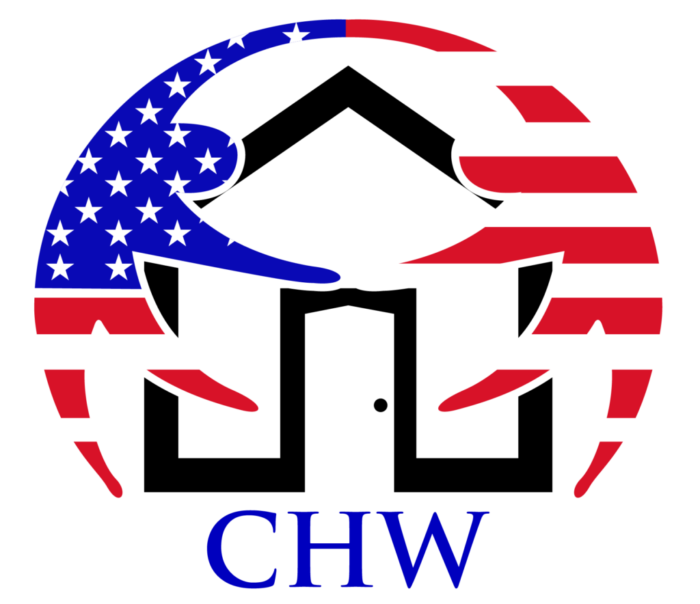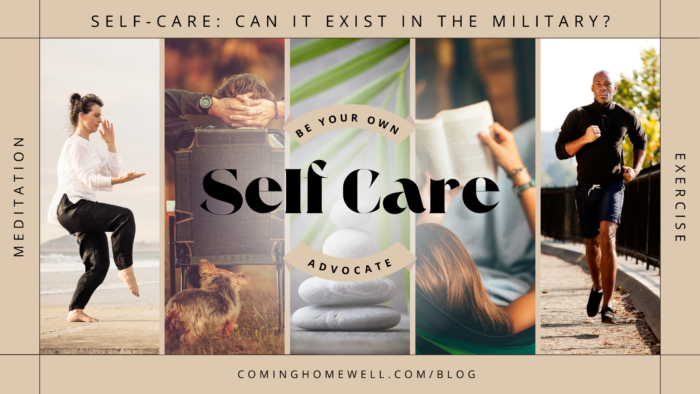By Donna Hoffmeyer
(original post on Medium)
This is a question that has consciously plagued me for the last 5 years (and probably subconsciously for the better part of my career); mostly because I am so bad at it. From the moment we sign on the dotted line, we begin the indoctrination of service before self. It’s not a hard concept to sell. We know joining the military means sacrifice. We are giving up some level of control of our lives for a higher purpose. We are the 1%, willing to make the sacrifice for our country’s freedom.
Noble act, to say the least.
However, if we are sacrificing then, in theory, it is impossible to take care of ourselves, right? I mean, let’s think about this. We sacrifice time for ourselves to complete the mission at any expense, and we do it successfully more times than not. (And if it was not successful, we’re spending time figuring out why.) Whatever little time is left over is given to family/friends/volunteer work/housework/mentoring, etc….
We make sure our troops have the resources they need to be successful. We try to make as many memories as possible with our kids before we deploy…just in case. We come back from deployment and try to give our partner a much-needed breather from handling it all, even though we may be mentally tapped out.
We sacrifice self-care for service to others. Hell, we aren’t even taught that self-care is an option. Service before self is our ethos. It is what we do. It is part of the package deal and we keep moving on…
….until we can’t.
I have seen it a thousand times. They are the rockstars, the go-to person, always have it all together, and there for everyone, all the time. Then they hit the wall, burned out. Maybe that one deployment changed the playing field. Maybe it is injuries — physical, mental, or moral. Maybe the cumulation of deployments finally took its toll. Maybe it is just the cumulation of years in the military, dealing with stressful, and at times, toxic environments.
They could solve every problem thrown at them (even those that weren’t theirs to solve). They gave sage advice to peers, subordinates, and leaders alike (but taking none of their own). They worked diligently to spread their time between missions, family, and friends…making sure everyone had their needs met (except their own). Now when they are left with a person in the mirror they don’t recognize, they have no idea how to care for them.
I know this story well, I was one of them.
By the time I retired, I had no idea where I went. The person staring back at me was tired, broken, sad, and relieved to not have a laundry list of ineffective meetings I had to attend. From there I had no idea what to do next. No one taught me to take time for myself. I came from a blue-collar farming family…work was all that we did. I was medical…giving was a one-way street. I was military…our ethos told us we came last. No one validated that it was okay to take time for myself. I needed actual permission. I needed to be pushed out the door and be told they would cover me. Instead, I went out the door with my phone on and available for any fires that arose.
In a way, there is a level of arrogance in that way of thinking. There are large periods we need to be present, engaged, and effective. But seriously tell me, what is going to completely fail if someone takes time off for themselves? Nothing. And if you are voicing disagreement, then you have control issues. (As an acknowledging control freak myself, I can say this with certainty.)
See, the military I grew up in, didn’t teach self-care. There was no time for that; we had missions to complete. We gave. We gave until the tank was empty and then we gave some more. When we were younger, the tank refilled fast. As the years went by, the line had leaks the tank took longer and longer to refill. In reality, it never fully refilled. A few drops, missing each time, until the tank was only filling up halfway. In our 20s, we were eager to be involved, learn skills, and hungry for as many adventures as possible. In our early 30s, we were growing into SMEs and leaders, and by the time we were in our late 30s and into our 40s, we were the leaders…and often burned out. We scratch our heads trying to figure out what happened. Then, we realized, we never checked the tank along the way, and when we needed it the most, it was empty.
I knew a few folks that did practice self-care. In my early years, I am ashamed to say, I labeled some of them as uncommitted, unengaged, and lazy. These were the people that ended the year with 2 days of leave left. (For those unfamiliar, the military gives 30 days of vacation (leave) time per year.) Later on, in my career, I had a healthy appreciation for the concept of self-care; encouraged others to take time for themselves; preached to the service members we took care of the importance of taking care of themselves; but still didn’t take it into practice. And then I met Lila (name changed for privacy).
Lila came to me, not under the best circumstances. There was a lot of unprofessional office gossip about her. She was lazy, she didn’t write her notes well, she was last in and first out the door…on and on. My perception was she was someone that was put in a very tough situation and struggling to keep up. Details are irrelevant for this blog, but the bottom line was my instincts were right. Given guidance and space, she was outperforming her peers by miles. However, there was one thing that caught my attention…her need for time off. Lila was like clockwork — out the door 9 hrs after she walked in the door; lunch was usually an hour; and I knew if we had a heavy workload for more than a week, she’d be asking for time off. Initially, I’d be a liar to say I wasn’t a bit annoyed.
As time went on, I learned more about Lila. She was that person that did give it all to the job at one time; and it nearly cost her, her marriage, and her family. She was not willing to go backward. She learned the work will always be there. She learned to utilize her work time better. She learned if she didn’t take care of herself, no one would. She learned to balance.
I can’t help but wonder what my peers, predecessors, and myself, at the end of our careers, would look like if we had performed self-care on a routine basis. Would the leadership style be different? Would more of us have stayed past 20 years and 1 second? If they did stay past 20, would they have been more effective? Would there be less toxic environments? More teamwork? Better mentoring? Less shame? More resiliency? Would the suicide rate drop?
The new generation coming into the military is less tolerant of the one-way street of self-sacrifice. Fortunately, the military is starting to respond. Wounded Warriors from every branch are seeing the effects of our cumulative lack of self-care. They are teaching service members how to take time for themselves; they are validating them, telling them it is okay to do something for themselves. I saw a FB post by CMSAF Bass (the Air Force’s top dog enlisted Airman) discussing self-care and her struggle with taking time for herself. She stated, “Self-care is a necessity, discipline, and non-negotiable.” She gets it. (Worth the read)
These are steps in the right direction. However, as the saying goes, “You can lead the horse to water, but you can’t make them drink.” The military can educate until the end of time. It won’t be worth crap if leaders and subordinates alike are not setting the example and applying the knowledge.
So how does self-care look? I’m probably the last person to ask…but I’ll humorously answer it by listing out all the things I didn’t do.
- Set boundaries (first find them)
- Say No (If you can say it to your children, you can say it to your workmates)
- Sleep (Just do it…everyone will thank you)
- Be forgiving…to yourself (seriously, be nice, you’re worth it)
- Breathe (The consequences of not, is dire)
- Shut the phone off (Yes, it has an off button)
- Ask for help (The response may surprise you)
- Sit quietly…alone (Parents, it’s possible…LOCK. BATHROOM. DOOR)
- Treat yourself (#icecreamfixeseverything)
- Exercise (chasing the ice cream truck does not count)
The military is starting to recognize the need. Leaders, such as Chief Bass, are setting the example and paving the way. Wounded Warrior Programs are jumping in and sharing information. Great start, but it’s not enough. More needs to be done to change the culture. Leaders need to get on board, support their commanders/supervisors, validate their subordinates and most of all set an example…be vulnerable, and share their successes and failures.
Veterans, keep this in mind. It is never too late to start and there is no finish line. Self-care is ongoing and by permitting yourself, you are allowing others to give themselves the gift of self-care.
What are your thoughts?


